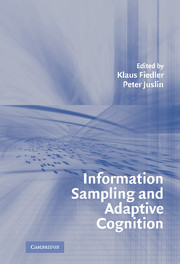Book contents
- Frontmatter
- Contents
- List of Contributors
- PART I INTRODUCTION
- PART II THE PSYCHOLOGICAL LAW OF LARGE NUMBERS
- PART III BIASED AND UNBIASED JUDGMENTS FROM BIASED SAMPLES
- 6 Subjective Validity Judgments as an Index of Sensitivity to Sampling Bias
- 7 An Analysis of Structural Availability Biases, and a Brief Study
- 8 Subjective Confidence and the Sampling of Knowledge
- 9 Contingency Learning and Biased Group Impressions
- 10 Mental Mechanisms: Speculations on Human Causal Learning and Reasoning
- PART IV WHAT INFORMATION CONTENTS ARE SAMPLED?
- PART V VICISSITUDES OF SAMPLING IN THE RESEARCHER'S MIND AND METHOD
- Index
- References
8 - Subjective Confidence and the Sampling of Knowledge
Published online by Cambridge University Press: 02 February 2010
- Frontmatter
- Contents
- List of Contributors
- PART I INTRODUCTION
- PART II THE PSYCHOLOGICAL LAW OF LARGE NUMBERS
- PART III BIASED AND UNBIASED JUDGMENTS FROM BIASED SAMPLES
- 6 Subjective Validity Judgments as an Index of Sensitivity to Sampling Bias
- 7 An Analysis of Structural Availability Biases, and a Brief Study
- 8 Subjective Confidence and the Sampling of Knowledge
- 9 Contingency Learning and Biased Group Impressions
- 10 Mental Mechanisms: Speculations on Human Causal Learning and Reasoning
- PART IV WHAT INFORMATION CONTENTS ARE SAMPLED?
- PART V VICISSITUDES OF SAMPLING IN THE RESEARCHER'S MIND AND METHOD
- Index
- References
Summary
INTRODUCTION
In many situations people must, at least implicitly, make subjective judgments about how certain they are. Such judgments are part of decisions about whether to collect more information, whether to undertake a risky course of action, which contingencies to plan for, and so on. Underlying such decisions are subjective judgments about the quality of the decision maker's information. Accordingly, many researchers have been interested in the mental processes underlying such judgments, which go under the general label of confidence.
There are many ways in which confidence can be expressed, both in the real world and in the research lab. For example, Yaniv and Foster (1995) present the concept of grain size. People communicate their confidence in an estimate via the precision (grain size) with which they express it. “I think it was during the last half of the nineteenth century” implies a different degree of confidence than “I think it was around 1875.” Listeners expect speakers to choose a grain size appropriate to their level of knowledge. People also use a variety of verbal probability terms to describe confidence in their predictions, choices, and estimates (e.g., “I'm pretty sure …,” “It's definitely not …,” “I really don't know, but …”), which people understand to imply different degrees of certainty (Wallsten & Budescu, 1983; Zimmer, 1984).
In the lab, most studies use one of three predominant paradigms.
Information
- Type
- Chapter
- Information
- Information Sampling and Adaptive Cognition , pp. 153 - 182Publisher: Cambridge University PressPrint publication year: 2005
References
Accessibility standard: Unknown
Why this information is here
This section outlines the accessibility features of this content - including support for screen readers, full keyboard navigation and high-contrast display options. This may not be relevant for you.Accessibility Information
- 3
- Cited by
